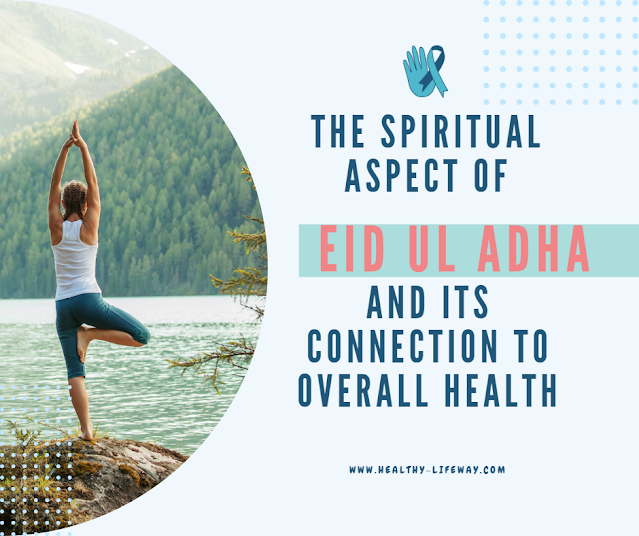The Spiritual Aspect of Eid ul Adha and its Connection to Overall Health
 |
| The Spiritual Aspect of Eid ul Adha and its Connection to Overall Health |
The Spiritual Aspect of Eid ul Adha and its Connection to Overall Health
Introduction:
Eid ul Adha, a momentous religious occasion observed by Muslims worldwide, is commonly referred to as the Festival of Sacrifice. While it is a time of joy, feasting, and family gatherings, Eid ul Adha holds a profound spiritual significance that extends beyond the festivities. In this article, we explore the spiritual aspect of Eid ul Adha and its deep connection to our overall health and well-being.
1. The Essence of Eid ul Adha:
Eid ul Adha marks the commemoration of Prophet Ibrahim's (Abraham's) obedient act of willingness to sacrifice his son in devotion to God. The story highlights unwavering faith and submission to a higher power. The spiritual essence of Eid ul Adha lies in understanding and embracing these core values.
2. Reflection and Gratitude:
Eid ul Adha encourages believers to reflect on their own lives, values, and the importance of gratitude. Taking a moment to contemplate our blessings and expressing gratitude can have a profound impact on our mental and emotional well-being. Studies show that cultivating gratitude reduces stress, enhances optimism, and promotes overall happiness.
3. Sacrifice and Selflessness:
One of the central rituals of Eid ul Adha involves the sacrifice of an animal, symbolizing Prophet Ibrahim's act of devotion. This act of sacrifice teaches us the values of selflessness, generosity, and compassion. Engaging in acts of kindness and giving back to the community not only benefits others but also nourishes our own spiritual and emotional health.
4. Connection with Others:
Eid ul Adha is a time when families, friends, and communities come together to celebrate. This sense of togetherness fosters a deep connection with others and creates a support system. Social connections play a vital role in our overall health, reducing feelings of loneliness and providing a sense of belonging.
5. Renewal and Cleansing:
Eid ul Adha also represents a time of renewal and spiritual cleansing. It encourages individuals to seek forgiveness, let go of grudges, and reconcile with others. The act of seeking forgiveness and resolving conflicts has a direct impact on our mental and emotional well-being, promoting peace within ourselves and our relationships.
6. Inner Peace and Serenity:
Engaging in prayer, meditation, and spiritual practices during Eid ul Adha can bring a sense of inner peace and serenity. These practices have been scientifically proven to reduce stress, anxiety, and improve overall mental health. Connecting with our spirituality helps us find meaning and purpose in life, leading to a greater sense of fulfillment.
Conclusion:
Eid ul Adha is more than just a festive occasion; it is a time of deep spiritual reflection and connection. Embracing the spiritual aspect of Eid ul Adha can have a profound impact on our overall health and well-being. By practicing gratitude, selflessness, forgiveness, and fostering social connections, we can experience inner peace, joy, and a heightened sense of purpose. Let us celebrate Eid ul Adha not only with grand feasts and joyous festivities but also by nurturing our spiritual selves for a healthier and more fulfilling life.







Post a Comment